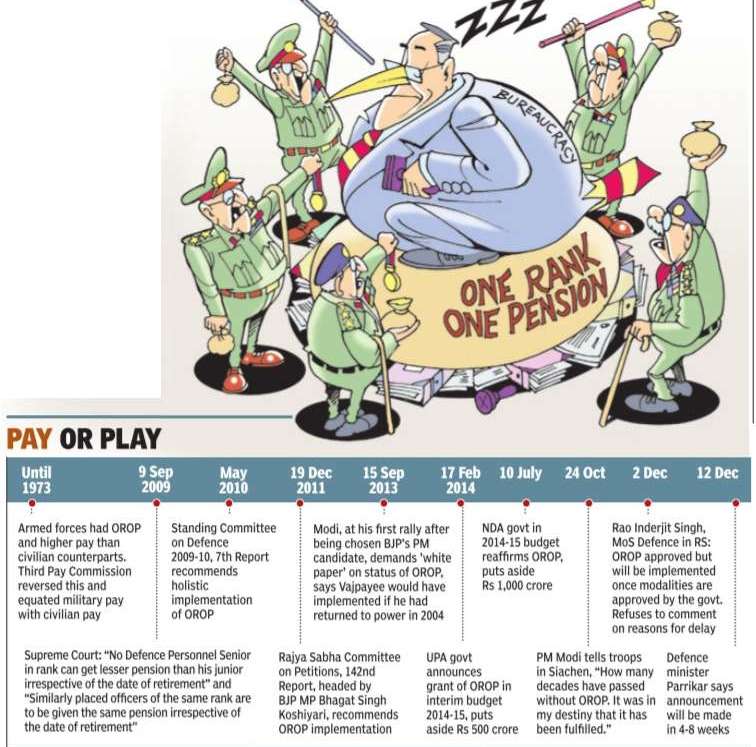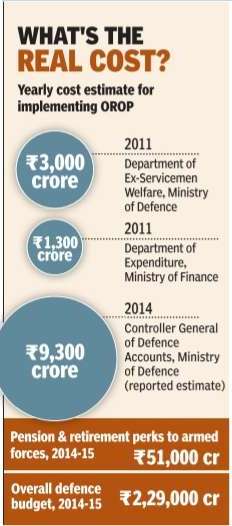One-Rank-One-Pension
(Created page with "{| Class="wikitable" |- |colspan="0"|<div style="font-size:100%"> This is a collection of articles archived for the excellence of their content.<br/> </div> |} [[Category:Ind...") |
|||
| Line 9: | Line 9: | ||
[[Category:Defence | ]] | [[Category:Defence | ]] | ||
| − | |||
''' OROP- Still a distant dream to be implemented ''' | ''' OROP- Still a distant dream to be implemented ''' | ||
[http://epaperbeta.timesofindia.com/Article.aspx?eid=31808&articlexml=PENSION-PROMISE-IN-PERIL-14122014018044''The Times of India''] | [http://epaperbeta.timesofindia.com/Article.aspx?eid=31808&articlexml=PENSION-PROMISE-IN-PERIL-14122014018044''The Times of India''] | ||
| − | [[File: pay1.jpg| |frame|500px]] | + | [[File: pay1.jpg|The ministers and their agendas on OROP|frame|500px]] |
[[File: pay2.jpg| |frame|500px]] | [[File: pay2.jpg| |frame|500px]] | ||
Nalin Mehta, December 14, 2014 | Nalin Mehta, December 14, 2014 | ||
Revision as of 15:14, 18 December 2014
This is a collection of articles archived for the excellence of their content. |
OROP- Still a distant dream to be implemented The Times of India
Nalin Mehta, December 14, 2014
Roman emperor Augustus started the tradition of military pensions in 13 BC, when every legionary who had fought 20 years for Rome was guaranteed a pension for-life. It set the bar for modern armies, and independent India continued the British tradition of financially privileging military service until the mid-1970s, when soldiers were paid more than civilian bureaucrats, in service and after retirement. All that changed with the Third Pay Commission, which brought military salaries in line with civil services, and while soldiers have long complained about political control over the military in independent India mutating into bureaucratic control, a row over the NDA's promise for one-rank-one-pension (OROP) for military veterans is raising questions about the government's ability to translate its intent into action. Many distinguished veterans argue that they are only asking for what was promised to them, pointing to the aphorism of Chankaya, the architect of the Mauryan empire, who is said to have advised his prodigy Chandragupta Maurya that: “The day a soldier has to demand his dues will be a sad day for Magadha. From then on you have lost all moral sanctions to be King.”
OROP means that every pension-eligible soldier who retires in a particular rank deserves the same pension, irrespective of date of retirement. Currently, soldiers who left the armed forces more recently receive more than those who did earlier, because successive pay commissions hiked salaries. SOLDIERS vs CIVILIANS
The case for OROP is predicated on military terms of service being much harsher than those for civil services. Most soldiers retire between 35-37 years of age, while officers below brigadier-or-equivalent do so at 54, with limited re-employment options. Civil servants, in contrast, retire at 60.
Moreover, the Sixth Pay Commission granted the facility of what bureaucrats call “non-functional upgrade” (NFU) to officers in all-India Group A services. This is a sort of ‘pay-promotion', allowing them, under certain conditions, to draw higher pay than their rank, without actually being promoted. Almost all civil servants benefit from this while defence services officers do not, even as their career pyramid is much steeper. Only 0.8% of defence officers make it to the rank of major general after 28 years of service, compared with a much higher rate of civil servants who are eligible to become joint secretaries at 19 years of service.

